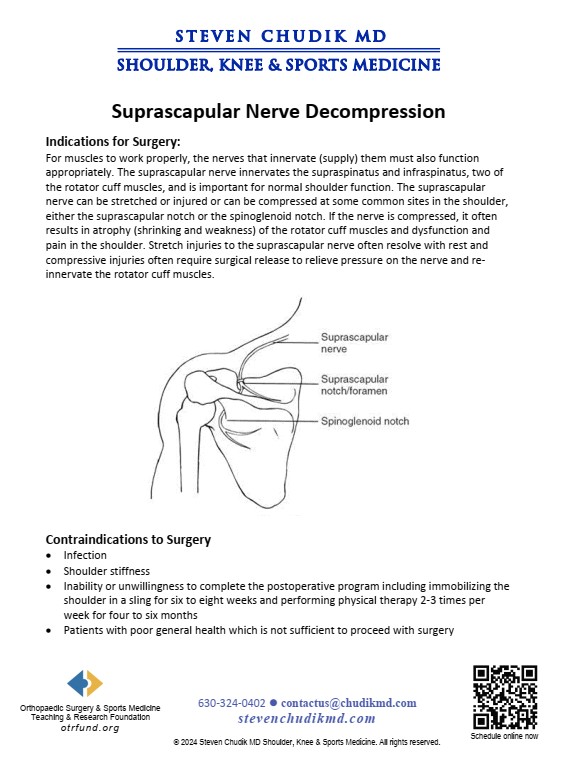For muscles to work properly, the nerves that innervate (supply) them must also function appropriately. The suprascapular nerve innervates the supraspinatus and infraspinatus, two of the rotator cuff muscles, and is important for normal shoulder function. The suprascapular nerve can be stretched or injured or can be compressed at some common sites in the shoulder, either the suprascapular notch or the spinoglenoid notch. If the nerve is compressed, it often results in atrophy (shrinking and weakness) of the rotator cuff muscles and dysfunction and pain in the shoulder. Stretch injuries to the suprascapular nerve often resolve with rest and compressive injuries often require surgical release to relieve pressure on the nerve and reinnervate the rotator cuff muscles.
For compressive suprascapular nerve problems, Dr. Steven Chudik uses MRI and nerve conduction/ electromyography studies to help determine the site of compression. With the known location of compression, Dr. Chudik approaches the shoulder arthroscopically through small incisions (arthroscopic portals) to look in the shoulder joint with a camera and special instruments to identify the nerve. He then will release tissue, bands, and/or cyst compressing the nerve to relieve pressure and allow the nerve to recover. At this time, Dr Chudik also will look for any labral or other related shoulder pathology and make any necessary repairs. If any repairs are needed, the patient can expect to be immobilized in a sling for six weeks followed by four to six months of formal physical therapy. After release of the nerve, it may require six months to a year, or longer, for the nerve to recover which is then followed by muscle recovery. In more severe and longstanding cases, nerve and muscle recovery may be incomplete. The surgery is generally performed as outpatient surgery (you go home the same day).
You may return to unlimited activities when there is no pain and full shoulder range of motion, muscle strength and endurance, and functional use has been restored. The timing of nerve and muscle recovery is variable following suprascapular nerve release and recovery may take longer than a year. Dr. Chudik will tell you when it is safe to resume all activities. Dr. Chudik has special protocols for returning to golf and other activities depending on patient goals.
Learn More